|
|
|
Sort Order |
|
|
|
Items / Page
|
|
|
|
|
|
|
| Srl | Item |
| 1 |
ID:
117056
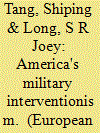

|
|
|
|
|
| Publication |
2012.
|
| Summary/Abstract |
By synthesizing material forces with ideational forces more organically via a social evolutionary approach, we advance a deeper understanding about post-World War II American military interventionism. We argue that post-World War II American military interventionism - that is, the American elites' and public's support for America's military intervention abroad - cannot be understood with ideational or psychological forces alone. Rather, two crucial material variables, namely, geography and aggregate power amplified by superior technological prowess, are indispensable for understanding the propensity for the United States to intervene militarily abroad. These two factors have powerfully shielded the American elites and public from the horrendous devastation of war. As a result, compared to their counterparts in other major states, American citizens and elites have tended to be less repelled by the prospect of war. The outcome is that since World War II the United States has been far more active in military intervention overseas than other major states.
|
|
|
|
|
|
|
|
|
|
|
|
|
|
|
|
| 2 |
ID:
153174
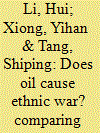

|
|
|
|
|
| Summary/Abstract |
This article contributes both empirically and methodologically. Empirically, we seek to advance our understanding of an important puzzle: does oil cause ethnic war? Methodologically, we seek to identify more precisely the different weaknesses and strengths of the quantitative approach and case studies with process-tracing by explicitly comparing results from these two approaches on the same empirical question. We thus subject the statistical association between the ethnogeographical location of oil and the onset of ethnic war to test with process-tracing. Examining several pathway cases, we find that oil has rarely been a deep cause of ethnic war. Instead, the ethnogeographical location of oil either reignites dormant conflict that has deeper roots in ethnic resentment and hatred or intensifies ongoing conflict, mostly by facilitating the operation of two interconnected mechanisms. Our study echoes the notion that quantitative exercises alone often cannot establish specific causal mechanisms or how contextual factors impact the operation of these mechanisms, and it is precisely on these two key fronts that qualitative exercises possess critical advantages. Hence, quantitative methods and qualitative methods are complementary rather than competitive. Our study also yields important policy implications for preventing and managing ethnic conflict in countries with rich mineral resource.
|
|
|
|
|
|
|
|
|
|
|
|
|
|
|
|
| 3 |
ID:
083657
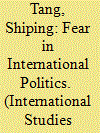

|
|
|
|
|
| Publication |
2008.
|
| Summary/Abstract |
There are two-and only two-fundamental positions on how to cope with the fear that is derived from the uncertainty over others' intentions in international relations (IR) literature. Because these two positions cannot be deduced from other bedrock assumptions within the different IR approaches, the two positions should be taken as an additional bedrock assumption. The first position, held by offensive realism, insists that states should assume the worst over others' intentions, thus essentially eliminating the uncertainty about others' intentions. The second position, held by a more diverse bunch of non-offensive realism theories, insists that states should not always assume the worst over others' intentions and that states can and should take measures to reduce uncertainty about each others intentions and thus fear. These two different assumptions are quintessential for the logic of the different theoretical approaches and underpin some of the fundamental differences between offensive realism on the one side and non-offensive realism theories on the other side. Making the two positions explicit helps us understand IR theories and makes dialogues among non-offensive realism theories possible.
|
|
|
|
|
|
|
|
|
|
|
|
|
|
|
|
| 4 |
ID:
163391
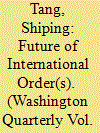

|
|
|
|
|
| Summary/Abstract |
When it comes to the future of the international order, we are now in a new Age of Anxiety. The international order will persist, but it will be less West-centric and fragmented. Although the rules will be more contested, that will not necessarily be politically violent or morally bad, but it will be more bottom-up–increasingly built upon regionalization and coordination.
|
|
|
|
|
|
|
|
|
|
|
|
|
|
|
|
| 5 |
ID:
108029
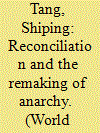

|
|
|
| 6 |
ID:
069868
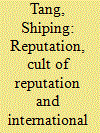

|
|
|
|
|
| Publication |
2005.
|
| Summary/Abstract |
Building on recent scholarship on reputation in international politics, this article argues that, because reputation for resolve cannot form in international conflicts due to anarchy, politicians' persistent belief in the value of reputation for resolve is merely a cult of reputation. After outlining the logic of the cult and an operational code derived from it, this article examines the pattern of influence that the cult has exerted on state behavior in conflicts. It then explores the possible cause of the cult. Finally, it proposes that integrating structural and psychological factors may be a productive enterprise for understanding state behavior, and that further work along this line may lead to interesting findings.
|
|
|
|
|
|
|
|
|
|
|
|
|
|
|
|
| 7 |
ID:
091379
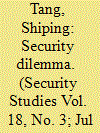

|
|
|
|
|
| Publication |
2009.
|
| Summary/Abstract |
Critically building upon the work of Herbert Butterfield, John Herz, and Robert Jervis, this article advances a more rigorous definition of the security dilemma. It demonstrates critical implications of the rigorously redefined concept. It examines several influential extensions and expansions of the original concept, showing that most have been inaccurate and misleading, and proposes remedies for correcting the mistakes. Finally, it identifies several areas of future research that may yield important new insights into the dynamics of the security dilemma.
|
|
|
|
|
|
|
|
|
|
|
|
|
|
|
|
| 8 |
ID:
091793
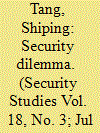

|
|
|
|
|
| Publication |
2009.
|
| Summary/Abstract |
Critically building upon the work of Herbert Butterfield, John Herz, and Robert Jervis, this article advances a more rigorous definition of the security dilemma. It demonstrates critical implications of the rigorously redefined concept. It examines several influential extensions and expansions of the original concept, showing that most have been inaccurate and misleading, and proposes remedies for correcting the mistakes. Finally, it identifies several areas of future research that may yield important new insights into the dynamics of the security dilemma.
|
|
|
|
|
|
|
|
|
|
|
|
|
|
|
|
| 9 |
ID:
102426
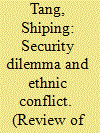

|
|
|
|
|
| Publication |
2011.
|
| Summary/Abstract |
I critically examine the existing literature on the security dilemma in ethnic conflict, thus laying part of the foundation for constructing a dynamic and integrative theory of ethnic conflict. I show that many attempts to apply the security dilemma to the understanding of ethnic conflict have been based on an imprecise and often mistaken understanding of the concept. I then emphasise that the security dilemma theory and the broader spiral model constitute a dynamic, versatile and powerful theory of strategic interaction that captures some general dynamics leading to the outbreak of war. As such, the security dilemma theory and the broader spiral model, when properly understood, can serve as part of the foundation of a dynamic and integrative theory of ethnic conflict, and such a theory will be able to integrate many diverse understandings of ethnic conflict from different schools of International Relations (IR) theory. I show the feasibility and the utility of such a theory.
|
|
|
|
|
|
|
|
|
|
|
|
|
|
|
|
| 10 |
ID:
095320


|
|
|
|
|
| Publication |
2010.
|
| Summary/Abstract |
I advance an endogenous explanation for the systemic transformation of international politics and offer to neatly resolve the debate between offensive realism and defensive realism through a social evolutionary approach. I contend that international politics has always been an evolutionary system and it has evolved from an offensive realism world to a defensive realism world. Consequently, offensive realism and defensive realism are appropriate grand theories of international politics for two different historical epochs. Different grand theories of international politics are for different epochs of international politics, and different epochs of international politics actually need different theories of international politics. Because international politics has always been an evolutionary system, non-evolutionary approaches will be intrinsically incapable of shedding light on the evolution of the system. The science of international politics must be a genuine evolutionary science and students of international politics must 'give Darwin his due'.
|
|
|
|
|
|
|
|
|
|
|
|
|
|
|
|
| 11 |
ID:
053362
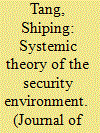

|
|
|
|
|
|
|
|